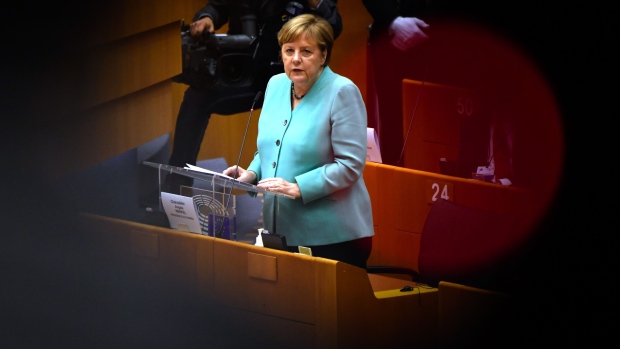Sep 5, 2020
Merkel’s Russian Pipeline Dilemma Laid Bare by Poisoning Uproar
, Bloomberg News

(Bloomberg) -- The furor over the poisoning of a top Russian dissident has put Angela Merkel’s controversial backing of a Baltic Sea pipeline in the spotlight, as patience with Vladimir Putin’s government hits its limit in Germany.
The German military’s finding this week that Alexey Navalny was attacked with a novichok nerve agent has triggered calls for the chancellor to wield her biggest stick: withdraw support for the Nord Stream 2 gas pipeline, which will ship Russian gas directly to Europe’s largest economy. Despite her growing exasperation with the Kremlin, that may not be so easy.
Even with top lawmakers demanding the project be halted and NATO condemning Moscow for the “appalling” attempted assassination of Navalny, there is still little appetite within Merkel’s coalition to abandon Nord Stream. At the moment, neither Merkel’s Christian Democratic-led bloc nor her Social Democratic partner is likely to rally around the demand, according to three Bundestag officials, who asked not to be identified because of the sensitive nature of the discussions.
That narrows the options for Merkel to send Putin a stern message, as the Navalny poisoning now tops a list of grievances, including a contract killing in a Berlin park in broad daylight last year and a 2015 cyberattack on the Bundestag.
Russian Response
The resistance in her coalition reflects key support for the project from German industry as well as deeper ties with Russia, particularly among the Social Democrats. The German Eastern Business Association, an industry group that supports trade with Moscow, warned against severing ties with Nord Stream, saying Merkel had “good reason” to separate the Navalny affair from the 764-mile undersea pipeline, led by Russia’s Gazprom PJSC.
Merkel, who issued an uncharacteristically sharp rebuke over the novichok finding and pledged a coordinated response among NATO and European Union allies, is keeping her cards close to her chest. Queried on the project at a news conference on Thursday, Merkel didn’t repeat her demand made days earlier that the project should be finished.
“Much will depend on whatever reaction we have from the Russian side,” Merkel said, acknowledging the Kremlin’s position that there was no evidence of poisoning. Putin spokesman Dmitry Peskov said the government was awaiting information from Germany over its findings.
But as Navalny lies in a medically induced coma in a hospital a short drive from Merkel’s chancellery, criticism of the pipeline grew -- undermining the official line that it’s mainly a commercial project. Friedrich Merz, a Merkel rival who is campaigning to lead her Christian Democrats, said any construction should be suspended for two years.
“Putin only understands this language, unfortunately,” Merz told Bild newspaper, which in an editorial also called on Merkel to halt the project.
On the other side of the divide is President Donald Trump, who has frequently attacked Nord Stream as a conduit for “billions” from Germany to Russia that he says Merkel’s government should be spending on defense. U.S. congress members are threatening additional sanctions after restrictions imposed in December brought pipe-laying work to a halt.
Potential Compensation
The U.S.’s open hostility to Nord Stream, which has raised complaints in Berlin of violating European sovereignty, is a factor in Berlin’s resolve, according to two Bundestag officials.
Merkel’s government may also have to compensate companies involved in the project. The Nord Stream consortium, which includes BASF SE’s Wintershall DEA unit and Austria’s OMV AG, plans to invest a total of 9.5 billion euros ($11.2 billion) in the pipeline.
In June, before a renewed threat of U.S. sanctions and escalation of tensions between Germany and Russia, state-run Gazprom said it would be able to complete the link this year and start shipments by late 2020 or early 2021.
While Russia has claimed Nord Stream 2 is needed because Europe’s own gas production is fast declining, demand on the continent largely remains stable due to the rise of renewables and an influx of liquefied natural gas from producers further afield, including the U.S. One of the main reasons for the link was to bypass Ukraine, a key transit nation, after price disputes in the past left Europeans with gas disruptions in winter.
Should Nord Stream 2 be scrapped, Russia may have to keep sending gas to Europe via Ukraine, as well as the already operational Nord Stream link.
Germany is the biggest foreign buyer of Russian gas, which makes up over 40% of its imports. That dependence is expected to intensify. Under Merkel’s plans to exit coal and nuclear power, gas is an almost unavoidable stop-gap as the country ramps wind and solar resources.
©2020 Bloomberg L.P.


